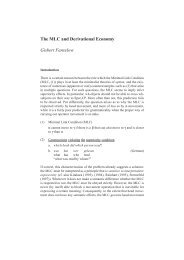'Split wh-constructions in Classical and Modern Greek'
'Split wh-constructions in Classical and Modern Greek'
'Split wh-constructions in Classical and Modern Greek'
Create successful ePaper yourself
Turn your PDF publications into a flip-book with our unique Google optimized e-Paper software.
with a change <strong>in</strong> the D-system. More precisely, the iterated<br />
determ<strong>in</strong>ers start out <strong>in</strong> separate appositional DPs <strong>and</strong> progressively<br />
weaken <strong>in</strong>to def<strong>in</strong>iteness morphemes as the two separate<br />
phrases are progressively <strong>in</strong>tegrated <strong>in</strong>to a s<strong>in</strong>gle modified noun<br />
phrase. This follows essentially Dev<strong>in</strong>e & Stephens’s 2000 suggestion<br />
(p. 238), but we will elaborate on this idea, s<strong>in</strong>ce they do<br />
not go <strong>in</strong>to any details.<br />
We propose that the merg<strong>in</strong>g of two DPs <strong>in</strong>to one stems from<br />
a categorial change from determ<strong>in</strong>er to agreement marker. The<br />
articles that surface <strong>in</strong> examples such as (43) are thus agreement<br />
markers, possibly for def<strong>in</strong>iteness, rather than determ<strong>in</strong>ers:<br />
(43) Idha to forema to kokk<strong>in</strong>o. (MG)<br />
see PAST 1SGthe dress the red<br />
‘It is the RED dress that I saw.’<br />
It has been suggested for MG (Androutsopoulou 1994) that iterated<br />
determ<strong>in</strong>ers are just a sort of morphological agreement to<br />
<strong>in</strong>dicate def<strong>in</strong>iteness, <strong>and</strong> that they have mechanically spread<br />
from the nom<strong>in</strong>al head. 5 Evidence for the idea that the article <strong>in</strong><br />
MG is an agreement marker rather than a determ<strong>in</strong>er comes from<br />
the fact that it is obligatory with generic subjects as <strong>in</strong> (45) <strong>and</strong><br />
proper names (unlike English) as <strong>in</strong> (46). In CG, on the other<br />
h<strong>and</strong>, that was not the case, as its use with proper names was<br />
only associated with previous mention <strong>in</strong> the discourse. For the<br />
expletive properties of Det <strong>in</strong> MG, see Roussou & Tsimpli<br />
(1994) <strong>and</strong> Tsimpli & Stavrakaki (1999).<br />
5 So-called determ<strong>in</strong>er spread<strong>in</strong>g can also be found <strong>in</strong> Semitic (cf. Shlonsky 2000),<br />
Amharic (cf. Halefom 1994), Hebrew (cf. Sichel 2002).<br />
168

















